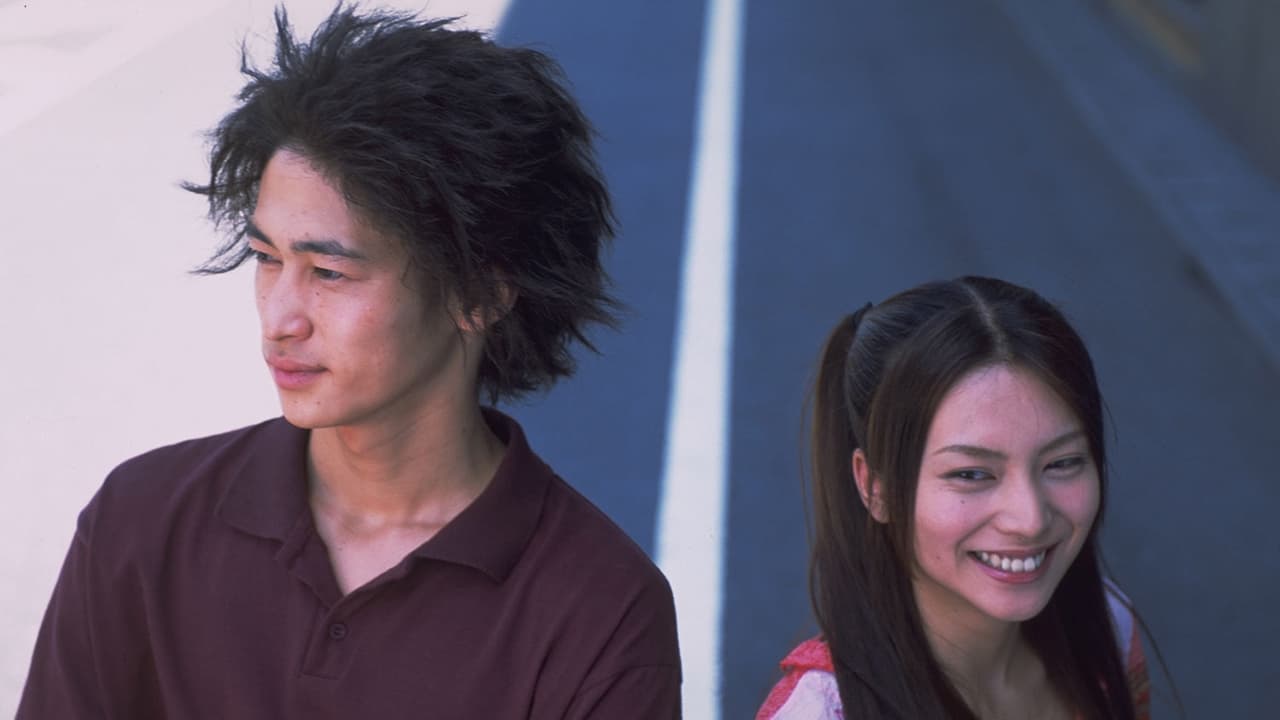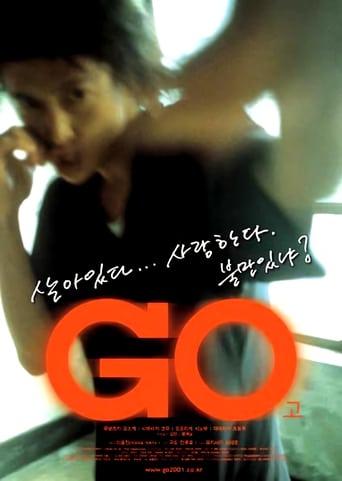

This film is so real. It treats its characters with so much care and sensitivity.
... View MoreOne of the most extraordinary films you will see this year. Take that as you want.
... View MoreLet me be very fair here, this is not the best movie in my opinion. But, this movie is fun, it has purpose and is very enjoyable to watch.
... View MoreThis is a small, humorous movie in some ways, but it has a huge heart. What a nice experience.
... View MoreMost reviews here reduced "Go" to a simple love story with great acting and a critique of the racist, Japanese society. I disagree, and rather think that the movie focuses on what it means and feels like to be of foreign descent in any country really. First, the love story does not take place for about the first half of the movie. Rather, the daily life of the protagonist who visits a North Korean high school and has a violent, communist father is shown. It is made clear that both sides, Japanese and Korean tell him that he is different than the ethnically Japanese. For instance, everyone who speaks a word of Japanese gets beaten up by the teacher, which, some might not believe it, is not normal or legal in Japan. From the Japanese side, a constant fear is shown. The peak of this is when a Japanese high school student kills the protagonist's old, classmate out of reaction. It gets very clear that the boy did not have any intention but rather felt afraid and intimidated by the "evil North Korean". Even the protagonist's communist father is aware of the difficulties that this stark difference brings and thus suggests him to change nationalities when having the opportunity to. The love story, which everybody seems to focus on, really takes place in the second part of the movie. It is rather another tool the director chooses to convey the feeling of being of foreign descent. It is not the object of the director to make a Bollywood-like love story, as some suggested here. To make this point clear, just think of the protagonist as ethnically Japanese. Critical scenes which made me like the movie, would not take place. The couple would not have stopped their attempt to have sex for the first time because the protagonist confessed that he is a Zainichi (Japanese. for being of Korean descent). She would not have told him that her father used to say that Chinese and Korean have "dirty" blood. He would not have to face an awkward family dinner in which the girls' father, who thought that he is Japanese), talked about how great and virtuous Japan is and how lucky they all are to be of this ethnicity.But why use a love story in the first place and not show daily microaggressions such as the American counterparts do, you may ask? The answer is because there are hardly any. The Japanese culture is very much formed by the concept of Honne and Tatamae. A person would never show his or her true face (Honne) to a stranger. You have to get very close to a person for him or her to say what is really on their mind. In addition, the protagonist puts an effort to seem as Japanese as possible. He hardly tells someone his Korean first name and instead introduces himself with his Japanese last name. As a German of European descent whose ex-girlfriend was Korean American, I can confirm with great confidence that this does not just take place in "evil, racist" Japan. I heard numerous times why I speak German so well and that I do not look Turkish because of the way I dress. I have even felt great improvements in my dating game after dying my hair brown/blondish for fun. At the end, my personal relation is maybe the reason why I liked this film so much. I, too am a Zainichi, who is not Muslim and does not agree or relate to Turkish or Muslim culture at all. Yet I am the first person who is asked to explain actions of the ISIS and the Turkish president, I know nothing about. The movie ends with a scene where the protagonist screams: "Where am I from? Why are you all afraid of me?!". I would recommend everyone to watch the movie and think of it of more than "just a love story with a critique of Japanese society".
... View MoreI had to watch this film for an university class. I liked how the main character was neither this nor that- He was neither Japanese, nor Korean. Neither South nor North. At the end of the movie he seems to accept that he is a Japanese born Korean, which shocked me. What shocked me more was that he was temperamental to all hell, but he was shown actually applying to schools and whatnot. While this movie does embody some patriarchal strains, to classify it as a "sterotypical Japanese" film would be incorrect as it is a movie told from a teenage boy's perspective. The quirks that the main female character has is a quality that endears her to him. Likewise, it is his ability to act out of context with societal roles that endears him to her. She admits to being attracted to his eyes after a fight- because they symbolized the wildness she sees in him. It's a sweet romantic film. Would I read deeper into it? No. Nice, sweet, fluffy and dramatic, but in the end it illicits the same "aw" if you can overlook the mixed in sadness, anger, and violence that subtly permeates the film.
... View MoreDirector: Yukisada Isao Duration: 122 MinutesAlmost two years ago in my War and Memory in Japanese Film Class I watched a film called Merry Christmas, Mr. Lawrence by the controversial film director Oshima Nagisa. One memorable scene in this film, amongst many others, is the cruelty displayed played by Sgt. Hara, Beat Takeshi, towards an imprisoned soldier named "Kanemoto." However, this is not the soldier's real name. He, like thousands of other Korean men, was forced to adopt Japanese names, because of the difficulty for the Japanese to pronounce Korean names, and serve in the Japanese military. Of course, this character comes to a pretty brutal end. Having to write a paper comparing one of the films in the class with another, I decided to compare how the Other is represented in Merry Christmas, Mr. Lawrence and Yukisada Isao's Go and let me say that it was indeed an eye-opening experience.Sugihara seems like a normal enough Japanese high school kid. He goes to class, plays basketball, reads books that his friends lend, etc. However, there is something different about Sugihara: he is not Japanese, but Korean, and not South Korean, but North Korean. Attending North Korean school until the time he enters high school. Sugihara spent his school days marching, learning the ideologies of Kim Il Sung and Kim Jong Il, and participating in classes devoted to self-criticism, which basically consisted of the teacher Mr. Kim beating students who broke the rule of speaking Japanese in school, but after he gets caught by the police after he and his friend Tawake and Wonsu attempt the Super Great Chicken Run, Sugihara ran in front of a train without getting killed, his father changes the family's nationality to South Korean, and soon after Sugihara decides to attend a Japanese high school. However, things do not go easy for our hero.Being a Korean, although born and raised in Japan, Sugihara is bullied at his new school. However, unlike many who are bullied, Sugihara knows how to fight from studying boxing with his father and after a particular fight where he takes on the school's entire basketball team; he becomes the target of students who want to prove themselves as fighters. He defeats all of them quite easily. The ideas of race and nation never crossed Sugihara's mind until one night at a birthday party for his friend a girl named Sakurai shows considerable interest in him. As their relationship grows, the burden of revealing his Korean heritage begins to weigh heavily on Sugihara. However, he is afraid that revealing his background will destroy the precious relationship he has developed with Sakurai.When Iwai Shunji released Swallowtail Butterfly in 1996 considerable interest within Japan's film industry was placed on minorities in Japan and films such as Yamamoto Masashi's Junk Food were created. However, almost four decades before similar issues were taken up by Oshima Nagisa in Death by Hanging and Imamura Shohei' My Second Younger Brother and more recent films tackling the issue include Sai Yoichi's, of Korean stock himself, Blood and Bones. However, where most of these films are quite serious, Go is a quite enjoyable film filled with humor while not becoming too didactic as a social commentary. The first half of the film is truly a delight with Sugihara's unusual relationships with his parents and the growth of his affection for Sakurai. The second half of the film tries to be a bit heavier and it sometimes comes off as being a bit forced. However, Go is a valuable film in introducing viewers to one group of Japan's little known minorities.
... View MoreI love this movie. Not only is Yusuke Kubozuka the man but this movie is just done really really well. It is a very good combination of stylistically surreal scenes such as the basketball scene and the race against the train, along with a plot that delves into issues that are very prevalent in Japanese society. A good friend of mine has experienced quite a bit of this prejudice in Japan being of partially Korean descent. It's actually been a little while since I've seen the movie so I can't really comment on too much of the specifics, but I just remember it as being a very intense experience that came through on a number of levels, combining an interesting love story, cool action sequences, humor, social commentary, and a coming of age story all into one amazing movie. Also it was great to see the actor who played the father again because he was so cool back in "Tampopo".
... View More